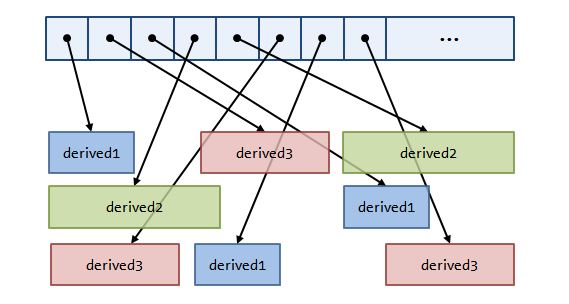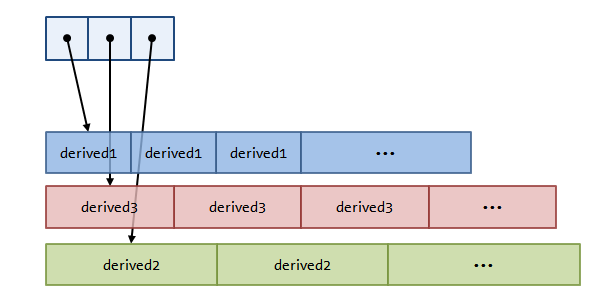Suppose we have a base abstract
class with implementations derived1,
derived2 and derived3. The memory layout of a std::vector<base*> (or similar constructs such as std::vector<std::unique_ptr<base>>
or boost::ptr_vector<base>) looks like the following:

Elements that are adjacent in the vector are not necessarily allocated contiguously,
much less so if the vector has undergone mid insertions and deletions. A typical
processing operation
std::vector<base*> v;
...
for(base* b: v){
...
}
is impacted negatively by two factors:
-
Scattering of elements throughout memory reduces CPU caching efficiency,
which in general favor regular access loops to contiguous memory areas.
-
Branch prediction
tries to minimize the effect of running conditional code (such as an
if-else
statement or the invocation of a base
virtual function) by speculatively executing a given branch based on past
history. This mechanism is rendered mostly useless when derived1,
derived2 and derived3 elements are interspersed along
the sequence without a definite pattern.
These limitations are imposed by the very nature of dynamic polymorphism: as
the exact types of the elements accessed through base's
interface are not known, an indirection through base* (a particular form of type erasure)
is required. There is however a critical observation: even though derived types
are not known when traversing a std::vector<base*>, the information is typically available
at compile time at the point of insertion in the vector:
std::vector<base*> v;
...
v.insert(new derived2{...});
A suitably designed container can take advantage of this information to arrange
elements contiguously according to their exact type, which results in an internal
data structure (a map of pointers to std::type_info
objects, actually) pointing to as many vectors or segments
as there are derived classes:

Traversing such a structure reduces to looping over all the segments one after
another: this is extremely efficient both in terms of caching and branch prediction.
In the process we have however lost the free-order capability of a std::vector<base*> (free order can only be retained at the
segment level), but if this is not relevant to the user application the potential
performance gains of switching to this structure are large.
The discussion has focused on base/derived programming, also known as OOP,
but it also applies to other forms of dynamic polymorphism:
-
std::function abstracts callable entities
with the same given signature under a common interface. Internally, pointer
indirections and virtual-like function calls are used. Memory fragmentation
is expected to be lower than with OOP, though, as implementations usually
feature the so-called small
buffer optimization to avoid heap allocation in some
situations.
-
The case of
std::function can be seen as a particular
example of a more general form of polymorphism called duck
typing, where unrelated types are treated uniformly
if they conform to the same given interface (a specified
set of member functions and/or operations). Duck typing provides the power
of OOP while allowing for greater flexibility as polymorphic types need
not derive from a preexisting base class or in general be designed with
any particular interface in mind --in fact, the same object can be duck-typed
to different interfaces. Among other libraries, Boost.TypeErasure
provides duck typing for C++. Under the hood, duck typing requires pointer
indirection and virtual call implementation techniques analogous to those
of OOP, and so there are the same opportunities for efficient container
data structures as we have described.
-
Closed polymorphism is the case where the acceptable
types are specified at compile time.
std::variant and Boost.Variant2
are prominent examples of closed polymorphism with underlying types (called
alternatives) being accessed through visitation.
Typical implementations of closed polymorphism do not involve dynamic allocation
(alternatives are stored union
style in shared storage), but grouping same-type objects together still
provides performance and space advantages.
Boost.PolyCollection provides four different container class templates dealing
with OOP, std::function-like polymorphism, duck typing as
implemented by Boost.TypeErasure, and closed polymorphism in the spirit of
std::variant:
-
boost::base_collection
-
boost::function_collection
-
boost::any_collection
-
boost::variant_collection
The interfaces of these containers are mostly the same and follow the usual
conventions of standard library containers.
 Boost
C++ Libraries
Boost
C++ Libraries





